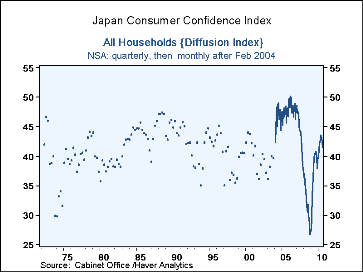 Global| Oct 12 2010
Global| Oct 12 2010Is Japan's Consumer Confidence Rebound Running Out Of Gas?
Summary
Consumer confidence in Japan slipped in September for the third month in a row. It is back at its level of April this year. Confidence ranks in the lower 40% of its long term range. Willingness to buy durable goods stands in the lower [...]
 Consumer confidence in Japan slipped in September for the third month in a row. It is back at its level of April this year.
Confidence ranks in the lower 40% of its long term range. Willingness to buy durable goods stands in the lower quartile of its range.
The consumer in Japan remains wary as the yen has shot up despite government efforts to stave off the rise.
Consumer confidence in Japan slipped in September for the third month in a row. It is back at its level of April this year.
Confidence ranks in the lower 40% of its long term range. Willingness to buy durable goods stands in the lower quartile of its range.
The consumer in Japan remains wary as the yen has shot up despite government efforts to stave off the rise.
After moving up sharply from a very deep cycle low made in December of 2008 Japan's rise in consumer confidence is engaged in its second backing and filling move of this rebound cycle.
Since climbing over the 40 mark, a mark that is still below the neutral level of 50 on this index, consumer confidence has had a harder time sustaining momentum. The disorder in the world trading system and continued strength of the yen weighs heavily on export-dependent Japan. Japan still has a large domestic demand but Japan identifies so much with its ability to export when that is not going well a pall sweeps across the nation.
Japan also has a great deal of debt and with this having become an anti-debt age of sorts that weighs on Japan too, even though it owes so much of its debt to its own citizens.
The news on the trade front is the most debilitating. Japan has exchange rate issues with the US and with China, its two main trading partners. And the US and China are having a real FX spat among themselves which is also involving Europe. In the meantime the yen has been pushing to 15 year highs despite the government's best efforts to stave off that sort of strength. We have seen that the OECD leading indicators have turned sour. Japanese consumers have little to be very positive about. A new government stimulus plan is in the offing but these have not worked out well in recent years. The drop back in consumer confidence is not surprising but is still unsettling.
| Japan Consumer Confidence | |||||
|---|---|---|---|---|---|
| Overall Livelihood |
Income Growth |
Employment | Willing to buy DurGds |
Value of Assets |
|
| Sep-10 | 42.4 | 41.1 | 37.8 | 43.5 | -- |
| Aug-10 | 43.0 | 41.5 | 40.1 | 45.0 | 38.7 |
| Jul-10 | 43.2 | 41.5 | 41.8 | 46.7 | 39.4 |
| Jun-10 | 43.6 | 41.6 | 41.4 | 47.2 | 39.4 |
| 3Mo Avg | 42.9 | 41.4 | 39.9 | 45.1 | 39.2 |
| 6-Mo Avg | 42.9 | 41.2 | 39.9 | 46.1 | 39.4 |
| 12-Mo Avg | 41.6 | 39.7 | 37.1 | 45.8 | 38.6 |
| Since March 2004 | |||||
| High | 47.5 | 46.6 | 55.2 | 51.9 | 50.2 |
| Low | 28.5 | 31.1 | 14.2 | 28.3 | 27.0 |
| Percentile | 73.2% | 64.5% | 57.6% | 64.4% | 50.4% |
| Rank % | 46.1% | 40.8% | 34.2% | 26.3% | 32.0% |
| Since June 1982 Pooled Monthly and Quarterly data | |||||
| Rank% | 37.6% | 30.3% | 43.0% | 23.0% | 27.9% |
| Value of assess analysis uses one-month lag | |||||
Robert Brusca
AuthorMore in Author Profile »Robert A. Brusca is Chief Economist of Fact and Opinion Economics, a consulting firm he founded in Manhattan. He has been an economist on Wall Street for over 25 years. He has visited central banking and large institutional clients in over 30 countries in his career as an economist. Mr. Brusca was a Divisional Research Chief at the Federal Reserve Bank of NY (Chief of the International Financial markets Division), a Fed Watcher at Irving Trust and Chief Economist at Nikko Securities International. He is widely quoted and appears in various media. Mr. Brusca holds an MA and Ph.D. in economics from Michigan State University and a BA in Economics from the University of Michigan. His research pursues his strong interests in non aligned policy economics as well as international economics. FAO Economics’ research targets investors to assist them in making better investment decisions in stocks, bonds and in a variety of international assets. The company does not manage money and has no conflicts in giving economic advice.
More Economy in Brief
 Global| Feb 05 2026
Global| Feb 05 2026Charts of the Week: Balanced Policy, Resilient Data and AI Narratives
by:Andrew Cates






